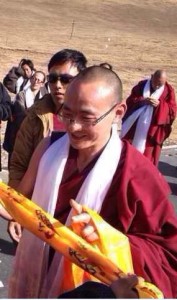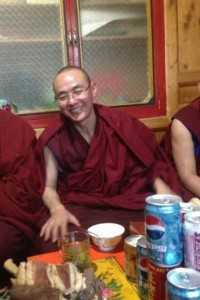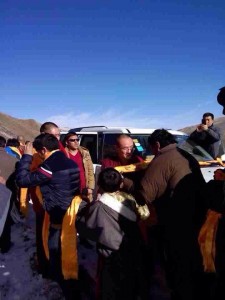
Writer, essayist, blogger, chronicler, environmentalist and amateur photographer Kunga Tsayang has been released after serving almost five years’ of imprisonment for allegedly writing political essays criticizing Chinese policies in Tibet.
According to reliable information received by TCHRD, Kunga Tsayang, who is also a monk from Labrang Tashikyil Monastery and wrote under a pen name “Sun of Snowland” (Tibetan: Gang Nyi) was released at around 8.30 am on 12 January 2014 from a prison in Lanzhou, capital of Gansu Province.
A source with contacts in Tibet told TCHRD that after release, Kunga Tsayang went to Labrang Monastery and from there on 14 January 2014, he returned to his hometown in Chikdril County in Golok (Ch: Guoluo) Tibetan Autonomous Prefecture, Qinghai Province, where a grand ceremony was held to celebrate his release. Local Tibetans, both young and old, came in droves bearing ceremonial scarves, as they burned juniper leaves and scattered ‘windhorse prayer flags’ (Tib: lungta) in the air to celebrate his release.
Kunga Tsayang was arrested by the County Public Security Bureau (PSB) officers on 13 March 2009. Born in Chikdril County, Tsayang was 20 at the time of his arrest. He was seized from his living quarters during a midnight raid by PSB officers on Labrang Monastery in Sangchu (Ch: Xiahe) County in Kanlho (Ch: Gannan) Tibetan Autonomous Prefecture, Gansu Province. On 15 November 2009, in a closed door trial, Kunga Tsayang was sentenced to 5 years in prison by the Kanlho Intermediate People’s Court for “disclosing state secrets.” Tsayang’s arrest and prison term stemmed from allegations that he had posted political essays on Tibet to a website known as Zin-dris (Eng: ‘Jottings’). He is the courageous author of several essays, which challenged the Chinese government’s policies regarding Tibet, including ‘Who Is the Real Splittist?’ ‘Who Is the Real Destroyer of Stability?’ ‘We Tibetans are the Real Witnesses’, and Who Is The Real Instigator of Protests?

Sources now tell TCHRD that Kunga Tsayang was punished for the contents of his essays, ‘Where is Our Government?’ ‘Lhasa is No More Lhasa’ and ‘Who is the Real Destroyer of Stability?’ In addition to the charge of ‘disclosing state secrets’, he was also charged of ‘separatist activities’ due to the essays he wrote. According to the source, Kunga Tsayang was severely interrogated after his arrest. His interrogators focused much of their attention on the essay “Lhasa is no more Lhasa”. “When asked what he (Kunga Tsayang) meant by the essay on Lhasa, he promptly responded ‘It is true you have built railway line, new housing facilities but in reality Lhasa is like the jewel of every Tibetan heart and nowadays both spiritual and secular life in Lhasa have deteriorated a great deal.” Likewise, when Kunga Tsayang was questioned on the contents of his essay, ‘Where is Our Government?’ he responded that the Chinese government had introduced many constitutional provisions, laws and regulations, however, for the autonomous areas, these constitutional provisions had not been implemented at all. However this response was cut short and he was not allowed to speak further by his interrogators.

Kunga Tsayang was originally from Lungkar Monastery in Golok but had been studying at Labrang Monastery. Educated at the Institute of Buddhist Dialectics at Labrang Monastery and in Beijing, Kunga Tsayang was known to take great pride in his ancestral Tibetan roots. He was regarded as a serious writer and photographer with dreams of becoming a professional photographer. Kunga had traveled widely throughout Tibet and documented the environmental degradation on the Tibetan plateau and its impact on the Tibetan people. His travelogues chronicled the unique characteristics of Tibetan topographical features, culture, customs, and religious heritage. Tsayang had reportedly been under the close watch of the Chinese authorities in Sangchu County, Gansu Province prior to his arrest, yet he dared to continue his travels to the far reaches of Tibet and China to carry out photo journalism. His presence at Labrang Monastery had generally been limited to important prayer rituals and ceremonies.
Kunga Tsayang also worked for Nyenpo Yutsae Environmental Protection Association, a Tibetan conservation protection group, which distributed materials to schools and conducted education campaigns about the Tibetan environment and the need to protect endangered species. He was reported to have been on an environmental expedition that discovered an endangered bird, thought only to be found in Tibet. Tsayang had also been working on setting up a new school at the Yakra Monastery.
It should be noted that Kunga Tsayang was released only two months earlier than his prison term of five years, rather than other reports stating that he was released seven months before the completion of his sentence.
Article 47 of the Chinese Criminal Law states: “A term of fixed-term imprisonment shall be counted from the date the judgment begins to be executed; if the criminal is held in custody before the execution of the judgment, one day in custody shall be considered one day of the term sentenced.” Fixed-term imprisonment is any imprisonment that ranges from 6 months to 15 years. [The Criminal Law of the PRC is available here]
Kunga Tsayang was arrested on 13 March 2009 and sentenced on 15 November 2013 to five years imprisonment. After his arrest, he was held incommunicado in secret detention for more than eight months before his sentencing. During his secret detention, he was subjected to rigorous interrogation and possibly beatings.
Note: This post contains new information on Kunga Tsayang’s arrest date and actual sentencing. It has now emerged that Kunga Tsayang was arrested on 13 March 2009 (and not 17 March 2009 as previously reported) and sentenced on 15 November 2009, not 12 November 2009.
